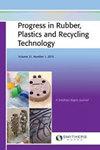Effects of thermoplastic poly(ether-ester) elastomer and bentonite on properties of recycled poly(ethylene terephthalate)
IF 1.6
4区 材料科学
Q4 MATERIALS SCIENCE, COMPOSITES
Progress in Rubber Plastics and Recycling Technology
Pub Date : 2023-05-06
DOI:10.1177/14777606231174915
引用次数: 0
Abstract
The synergistic effects of thermoplastic poly(ether-ester) elastomer (TPEE) and bentonite nanoclay on mechanical, morphological, thermal, and dynamic mechanical properties of recycled poly(ethylene terephthalate) (R-PET) were investigated. The efficiency of TPEE as impact modifier for the R-PET was evidenced by a significant increase in the impact strength and elongation at break with increasing TPEE contents (from 10 to 30 wt%), while the tensile strength and Young’s modulus exhibited an opposite trend. The 70/30 (wt%/wt%) R-PET/TPEE blend was selected as an optimum formulation for further blending with a very low loading of bentonite (1−5 parts per hundred of resin, phr) using the same processing techniques (extruding and injection molding). X-ray diffraction and transmission electron microscopy revealed that the 1 phr bentonite nanocomposite exhibited an exfoliated structure with the highest improvement in the mechanical properties compared with other nanocomposites and the unfilled blend. Meanwhile, the nanocomposites with 2, 3, and 5 phr bentonite formed tactoid or agglomerated bentonite morphology. Differential scanning calorimetry, thermogravimetric and dynamic mechanical analyses demonstrated a noticeable increase in the crystallization temperature, a comparable thermal stability, and a slight increase in the glass transition temperature, respectively, of all nanocomposites when compared with those of the neat R-PET. Graphical Abstract热塑性聚醚酯弹性体和膨润土对再生聚对苯二甲酸乙酯性能的影响
研究了热塑性聚醚酯弹性体(TPEE)和膨润土纳米粘土对再生聚对苯二甲酸乙酯(R-PET)的力学性能、形态性能、热性能和动态力学性能的协同效应。随着TPEE含量的增加(从10%到30%),R-PET的冲击强度和断裂伸长率显著增加,而拉伸强度和杨氏模量呈现相反的趋势,这证明了TPEE作为冲击改性剂的效率。选择70/30 (wt%/wt%)的R-PET/TPEE共混物作为最佳配方,与极低负载的膨润土(1 - 5 / 100树脂,phr)使用相同的加工技术(挤压和注塑)进行进一步共混。x射线衍射和透射电镜结果表明,与其他纳米复合材料和未填充共混物相比,1 phr膨润土纳米复合材料表现出剥离结构,力学性能改善最大。与此同时,含2、3、5phr膨润土的纳米复合材料形成了膨润土的片状或团块形态。差示扫描量热法、热重法和动态力学分析表明,与纯R-PET相比,所有纳米复合材料的结晶温度、热稳定性和玻璃化转变温度均有显著提高。
本文章由计算机程序翻译,如有差异,请以英文原文为准。
求助全文
约1分钟内获得全文
求助全文
来源期刊

Progress in Rubber Plastics and Recycling Technology
MATERIALS SCIENCE, COMPOSITES-POLYMER SCIENCE
CiteScore
4.40
自引率
7.70%
发文量
18
审稿时长
>12 weeks
期刊介绍:
The journal aims to bridge the gap between research and development and the practical and commercial applications of polymers in a wide range of uses. Current developments and likely future trends are reviewed across key areas of the polymer industry, together with existing and potential opportunities for the innovative use of plastic and rubber products.
 求助内容:
求助内容: 应助结果提醒方式:
应助结果提醒方式:


